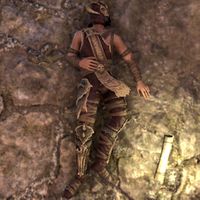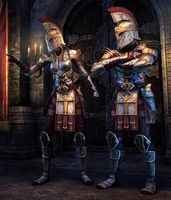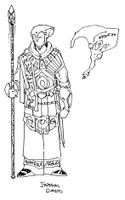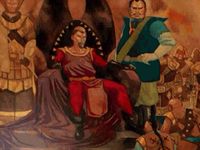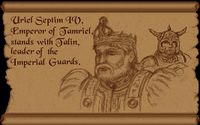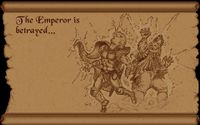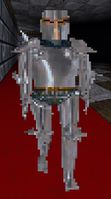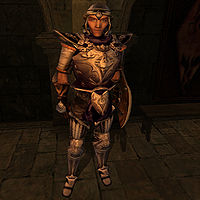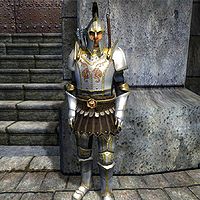Lore:Imperial Guard
The Imperial Guard, also referred to as the shadow legion,[1] were charged with the sole task of ensuring the personal safety and defense of the Tamrielic Emperors and various of their direct representatives across the provinces.[2] The Guard were known as the greatest warrior-mages in Tamriel,[UOL 1] and existed as an elite unit under the Imperial Legion umbrella.[2] There was a traditional rivalry set between the Imperial Guard their counterparts in the regular Legions.[2]
They kept their quarters and training hall within the Imperial Palace.[3][4][5]
The Imperial Guard seemingly utilized tamed creatures to help in their duties, such as Dragons,[6][UOL 2] and Bears.[UOL 3]
A common Imperial Guardsman is not to be confused with a member of the Blades Guard, who served under the Imperial Guard umbrella in a more ceremonial role as the honor guard of Dragonborn Emperors.[7][8]
Contents
History[edit]
The Interregnum[edit]
When the Imperial Guard came into existence is unknown, but their prominence can be traced back to the Interregnum. Consistent with more contemporary times, they protected the Emperors as bodyguards.[9][10] During the reign of the Longhouse Emperor Moricar, the Imperial Guard consisted of mostly Reachfolk. Moricar's Guard had werewolves among its ranks.[11] Following the fall of the dynasty, some the guard returned to the Reach.[12][13][14]
The Proving[edit]
The Battlespire was utilized for centuries as a Testing Facility and Proving Ground for those who wished to join the Imperial Guard. Recruits of this Imperial Battle College were known as Potentials and were usually identified as preteens. These Potentials learn about magic, the art of magical and martial warfare, as well as contemporary studies. Every year there was a Potentials Battle Tourney, where the first and second place winners are allowed to enter the Battlespire Proving Ground.[15][16][UOL 1] Only those who could prove themselves by successfully mastering the challenges of Battlespire were chosen for the Emperor's Imperial Guard.[UOL 1][16]
Tiber War[edit]
Circa 2E 864, the Imperial Guard were actively serving Emperor Tiber Septim.[17]
Queenmakers[edit]
Circa 3E 3, General Symmachus of the Imperial Army and Imperial Guards under his command, rode to Skyrim to collect a ward of the Septim Empire: Princess Barenziah of Clan Ra'athim and install her as the provincial Queen of Morrowind, to rule from the seat of Mournhold in Almalexia City. As ordered by his Emperor, General Symmachus would set aside his Imperial General and Governor titles to serve as Barenziah's Prime Minister, and even went on to marry her.[18]
Imperial Guard remained stationed within Mournhold for several centuries.[18]
In the time following the theft of the Staff of Chaos from Mournhold, Circa 3E 376, the relationship between the Morrowind Queendom and the Septim Empire slowly deteriorated. Imperial taxes were raised and quotas were increased with each passing year. Prime Minister Symmachus believed the Emperor had some suspicions that the Prime Minister had some role in the Staff's theft; in order to prove his loyalty to the Dragon Throne he made every effort to comply with the with the escalating demands. He lengthened working hours and raised tariffs, and even made up some of the difference from both the royal exchequer and the family's own private holdings. But the levies multiplied, and commoners and nobles alike began to complain. Symmachus sent his lady wife Barenziah to plead with the Emperor, and even said that she could tell the Emperor that: without his aid, the Empire would have never begun, and that he can bring about its fall if need be. Eventually, a rebel revolt ensued in the city, with the Imperial Guard allegedly joining the rebels, somehow resulting in Symmachus's death Circa 3E 391.[18]
Imperial Simulacrum[edit]
Circa 3E 389, General Talin Warhaft was leader of Imperial Guard. Warhaft and others of the Emperor's Imperial Guard were banished into Oblivion by the Imperial Battlemage of Tamriel, Jagar Tharn, and physically replaced by doppelgangers.[3][4] Tharn used these faux Guards as puppets serving his own machinations. When General Warhaft was saved by the Eternal Champion and returned to Tamriel, he seemingly resumed his duties.[3]
The Battlespire was partially destroyed by the forces of Mehrunes Dagon during the Imperial Simulacrum.[6] However, upon Restoration, Emperor Uriel chose to retake the destroyed facility,[19] despite advice from his treasury to not.[16] However it remained inactive as an Imperial Proving Ground.[20]
The Decline[edit]
In the later Third Era,[nb 1] Lady Allena Benoch became head of the Emperor's Imperial Guard under Uriel VII. She neither confirms nor denies her role in the removal of Calaxes Septim as Archbishop of The One while serving in the Guard.[21]
Circa 3E 427, Vedam Dren, Duke of Vvardenfell, had Imperial Guard' assigned to his service.[22]
When Emperor Uriel Septim VII was assassinated by the Mythic Dawn,[5] the Imperial Guard joined the regicide investigation alongside the: Elder Council, Imperial Legions, Arcane University, and Imperial Battle College.[23]
Circa 4E 48, the Imperial Guard was still in operation, regarded as professionals compared to the Penitus Oculatus.[24]
Notable Members[edit]
- Zuuk, knight of the Imperial Guard circa 1E 2920[25]
- Talin Warhaft, General of the Imperial Guard circa 3E 389
- The Apprentice, high member of the Imperial Legions circa 3E 399[16]
- Josian Kaid, high member of the Imperial Legions circa 3E 399[16]
- Vatsaha Trenelle, high member of the Imperial Legions circa 3E 399[16]
- The Agent, may have once been a member of the Imperial Guard serving in Cyrodiil City[26]
- Allena Benoch, head of the Emperor's Imperial Guard circa 3E 427[21]
Known Ranks[edit]
The exact hierarchy of ranks, the nuances between them, and the trajectory of advancement, has not been spelled out, but can generally be understood as categorized below.
Gallery[edit]
Notes[edit]
- Given the broad usability of the term: Imperial Guard, the elite unit of royal protectors are quite easily confused with the more common local guards serving the Empire.
References[edit]
- ^ Battlespire Intro Narration
- ^ a b c Imperial Guard topic during Morrowind
- ^ a b c d Events of Arena
- ^ a b French version of Arena's Manual Intro Story
- ^ a b Events of Oblivion
- ^ a b Events of Battlepisre
- ^ Jauffre's dialogue during Oblivion
- ^ The Book of the Dragonborn — Prior Emelene Madrine
- ^ a b Events of ESO
- ^ a b Imperial Guard Centurion Uniform description
- ^ Senan in ESO
- ^ Arana's dialogue in ESO
- ^ Senan's Note quest item description in ESO
- ^ Arloakh's dialogue in ESO
- ^ a b Meet the Character - Lucilla Caprenia — Martus Tullius
- ^ a b c d e f Battlespire Athenaeum
- ^ Redguard Introduction
- ^ a b c d The Real Barenziah — Anonymous
- ^ Tamrielic Lore — Yagrum Bagarn
- ^ The Doors of Oblivion — Seif-ij Hidja
- ^ a b c Words and Philosophy
- ^ Events of Morrowind
- ^ Assassination!
- ^ The Infernal City — Greg Keyes
- ^ 2920, The Last Year of the First Era
- ^ Daggerfall Player Character Background Histories
Note: The following references are considered to be unofficial sources. They are included to round off this article and may not be authoritative or conclusive.
- ^ a b c Battlespire E3 1997: STORYBAT.TXT
- ^ Gary Noonan's Posts
- ^ Unused Content of Elder Scrolls Online 1.6.3

